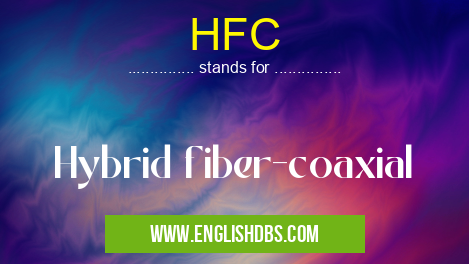What does HFC mean in TELECOM
Hybrid fiber-coaxial (HFC) is a telecommunications technology that combines optical fiber and coaxial cable to provide broadband internet, television, and telephone services to homes and businesses. HFC networks are typically deployed in areas where fiber-to-the-home (FTTH) is not yet available or cost-effective.

HFC meaning in Telecom in Computing
HFC mostly used in an acronym Telecom in Category Computing that means Hybrid fiber-coaxial
Shorthand: HFC,
Full Form: Hybrid fiber-coaxial
For more information of "Hybrid fiber-coaxial", see the section below.
How HFC Works
HFC networks use a combination of fiber optics and coaxial cable to deliver services. Fiber optic cables are used to connect the central office to the neighborhood node, while coaxial cables are used to connect the node to individual homes and businesses. The fiber optic cables provide high-bandwidth connectivity, while the coaxial cables provide lower-bandwidth connectivity. This combination allows HFC networks to deliver a wide range of services, including high-speed internet, digital television, and voice over IP (VoIP) telephone service.
Advantages of HFC
- High-speed internet: HFC networks can provide internet speeds of up to 1 gigabit per second (Gbps). This makes HFC networks ideal for online gaming, streaming video, and other bandwidth-intensive activities.
- Digital television: HFC networks can deliver digital television channels in both standard and high definition. HFC networks also support interactive television services, such as video on demand and pay-per-view.
- Voice over IP: HFC networks can deliver VoIP telephone service. VoIP service is typically less expensive than traditional landline telephone service, and it offers features such as call waiting, caller ID, and voicemail.
Disadvantages of HFC
- Limited bandwidth: HFC networks have a limited amount of bandwidth compared to FTTH networks. This can lead to congestion during peak usage times.
- Signal interference: Coaxial cables are susceptible to signal interference from other electronic devices, such as microwaves and cordless phones. This can lead to degraded service quality.
Essential Questions and Answers on Hybrid fiber-coaxial in "COMPUTING»TELECOM"
What is Hybrid Fiber-Coaxial (HFC)?
HFC is a technology that combines fiber-optic cables with coaxial cables to deliver high-speed internet, television, and telephone services. The fiber-optic cables provide high-bandwidth capacity, allowing for fast internet speeds and high-quality video streaming. The coaxial cables are used to distribute signals to individual homes and businesses.
What are the benefits of HFC over traditional cable?
HFC offers several benefits over traditional cable, including:
- Faster internet speeds: HFC can deliver internet speeds of up to 1 gigabit per second (Gbps), which is significantly faster than the speeds typically offered by traditional cable.
- Higher bandwidth capacity: HFC provides a wider bandwidth than traditional cable, allowing for more devices to be connected simultaneously without experiencing slowdowns.
- Improved video quality: HFC delivers higher-quality video streaming than traditional cable, with reduced buffering and fewer dropouts.
What are the drawbacks of HFC?
There are a few potential drawbacks to HFC, including:
- Limited availability: HFC is not available in all areas, particularly in rural areas.
- Higher cost: HFC can be more expensive than traditional cable, especially at higher speeds.
- Susceptibility to interference: HFC signals can be affected by interference from other electronic devices, such as microwaves and cordless phones.
Is HFC the best option for me?
Whether HFC is the best option for you depends on your individual needs and circumstances. If you need high-speed internet, high-quality video streaming, and a reliable connection, then HFC may be a good choice for you. However, if you are on a budget or do not need the fastest possible speeds, then traditional cable may be a more affordable option.
Final Words: HFC is a mature technology that provides a wide range of broadband services to homes and businesses. HFC networks are typically deployed in areas where FTTH is not yet available or cost-effective. While HFC networks have some limitations, they offer a cost-effective way to deliver high-speed internet, digital television, and VoIP telephone service.
HFC also stands for: |
|
| All stands for HFC |
